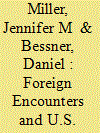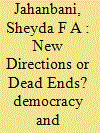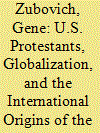|
|
|
Sort Order |
|
|
|
Items / Page
|
|
|
|
|
|
|
| Srl | Item |
| 1 |
ID:
179052


|
|
|
|
|
| Summary/Abstract |
On December 20, 1940, U.S. President Franklin Delano Roosevelt delivered his sixteenth fireside chat. With Europe reeling from Nazi Germany’s successful conquest of France, the signing of the Tripartite Pact, and the recently concluded Battle of Britain, Roosevelt implored Americans to build “the great arsenal of democracy” that would aid the United Kingdom in its struggle against Germany.
|
|
|
|
|
|
|
|
|
|
|
|
|
|
|
|
| 2 |
ID:
179051


|
|
|
|
|
| Summary/Abstract |
I began this talk fully expecting that we would meet face-to-face in June, that we would shake hands and embrace, sit side by side in tight-packed rooms; ride elevators together, and maybe poke around the city at odd hours, jostling with the crowds of tourists who had come to New Orleans strictly for fun. I did not know this talk would end up as a requiem for the conference we lost; the words never spoken, the colleagues never applauded, and those we will never see again.
|
|
|
|
|
|
|
|
|
|
|
|
|
|
|
|
| 3 |
ID:
179070


|
|
|
|
|
| Summary/Abstract |
In April 1972, the Brazilian Ambassador to the Organization of American States (OAS), George Maciel, delivered a forceful speech to the plenary of the third United Nations Conference for Trade and Development (UNCTAD), held in Santiago, Chile. Identifying Brazil as a member of the Third World, Maciel castigated developed countries for their lack of meaningful cooperation toward poor nations, as well as for implementing protectionist measures against commodities and manufacturing goods coming from the South. According to Maciel, every time that “developing countries (managed) to increase their competitive capacity and (began) to penetrate into the markets of developed countries,” they were faced with protective measures. The only alternative for developing and underdeveloped countries to close the gap between the First and Third Worlds, concluded the Brazilian Ambassador, was to improve the institutionalization of UNCTAD, implementing Third World deliberations for the reform of the international economic order.
|
|
|
|
|
|
|
|
|
|
|
|
|
|
|
|
| 4 |
ID:
179068


|
|
|
|
|
| Summary/Abstract |
Amidst the many surreal moments we have witnessed in U.S. politics since November 2016, you would not be blamed for having missed one of the more curious—if outwardly boring—ones. This episode came with no tweets, tantrums, or tirades; indeed, in an unusual twist, it did not even traffic in the casual degradation of women or people of color. Instead, it had the refreshing appearance of a quotidian Washington scene.
|
|
|
|
|
|
|
|
|
|
|
|
|
|
|
|
| 5 |
ID:
179067


|
|
|
|
|
| Summary/Abstract |
In December 1983, the United States announced its intention to leave the United Nations Educational, Scientific, and Cultural Organization (UNESCO). Great Britain followed suit shortly thereafter and formally withdrew in 1985. The principal reason for these dramatic departures was UNESCO’s alleged “hostility toward the basic institutions of a free society, especially a free market and a free press.”1 Both the United States and Great Britain complained that Third World representatives were undermining the free flow of information, a value that the agency’s Constitution vowed to defend. Over the previous decade, many UNESCO delegates had questioned the fundamental tenets of liberal press freedom by advocating for a New International Information Order (NIIO), which called upon governments to guarantee fair media content and to globally redistribute information technology. Whereas North Atlantic countries emphasized negative press freedom, principally freedom from state interference, representatives from decolonized, non-aligned, or so-called developing nations—what I refer to as the Global South—argued that news could not be left to market forces, as this would undermine other freedoms such as economic sovereignty.2 Seeing this stance as a communist conspiracy, North Atlantic delegates roundly rejected corresponding proposals to reform UNESCO, leading to the ultimate withdrawal of the United States and Great Britain.
|
|
|
|
|
|
|
|
|
|
|
|
|
|
|
|
| 6 |
ID:
179066


|
|
|
|
|
| Summary/Abstract |
As liberal policymakers and education reformers set about tackling the problem of poorly performing urban schools in the 1960s and 1970s, they turned not only to the works of progressive education heavyweights like John Dewey or Maria Montessori, or popular radical pedagogues like Paulo Friere, but also to methods and ideas first developed in the Peace Corps—President John F. Kennedy’s experimental program “to promote world peace and friendship” by sending young U.S. volunteers abroad.1 Reformers, federal officials, and local school boards sought to adapt Peace Corps practices for domestic teacher training and hailed returned volunteers as ideal candidates to educate the nonwhite children of the nation’s “slum schools.”
|
|
|
|
|
|
|
|
|
|
|
|
|
|
|
|
| 7 |
ID:
179065


|
|
|
|
|
| Summary/Abstract |
Between World War II and the 1960s, Americans’ sense of what constitutes living in a democracy had transformed. Activists in the left-liberal tradition rejected the status quo and became impatient with slow-paced change, emphasized grassroots participation, and called for racial inclusion. The changes in democratic practice were most pronounced among baby boomer youths, who participated in the free speech movement, in the sit-ins and civil rights marches, in anti-war protests, and in the sexual revolution.
|
|
|
|
|
|
|
|
|
|
|
|
|
|
|
|
| 8 |
ID:
179069


|
|
|
|
|
| Summary/Abstract |
In 1964, the Stanford linguist Robert Politzer made a surprising claim in the pages of the Modern Language Journal. American linguists were then attaining unprecedented influence in the field of foreign-language teaching, promising dramatically improved results if teachers adhered to their methods and shaping classroom practices and materials from primary to postsecondary contexts. Politzer concluded that the reason for linguists’ influence was not, however, due to the merit of their ideas alone. “[Linguistic] theory by itself is perhaps not sufficient to shape pedagogical procedure,” he wrote. “[Above] all, our general attitude toward international communication [is] decisive.”
|
|
|
|
|
|
|
|
|
|
|
|
|
|
|
|
| 9 |
ID:
179071


|
|
|
|
|
| Summary/Abstract |
On a summer day in 1935, James Gordon Holdcroft, an American Presbyterian missionary in colonial Korea, hurried to the Educational Bureau of the Government-General. He had an urgent meeting with its chief, Watanabe Toyohiko, to discuss the recent change of tone in the government’s educational policy, which mandated all students without exception to salute at the shrines of State Shinto. Believing that such a ritual marked no ordinary gesture of respect for fallen soldiers but an act of pagan worship honoring spirits, Holdcroft found the policy hard to accept for mission schools. Deeply troubled about its consequences, he hoped to hear from the authorities more about the matter. At the bureau, after the usual welcoming remarks, the educational chief reassured him that mission schools would be exempted from any rite that could offend Christians. Holdcroft felt relieved and returned to his office.1 Yet in late fall, he realized that Watanabe’s promise failed to materialize. Mission schools received orders from the government to participate in shrine ceremonies. Holdcroft’s fear came true.
|
|
|
|
|
|
|
|
|
|
|
|
|
|
|
|
|
|
|
|
|